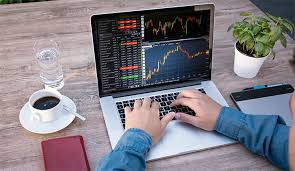
Understanding Forex Trading: A Pathway to Financial Freedom
Forex trading, or foreign exchange trading, is the act of buying and selling currencies with the aim of making a profit. As one of the largest and most liquid financial markets in the world, it attracts traders from all walks of life. Whether you are a seasoned professional or a newcomer eager to explore this dynamic arena, understanding the fundamentals of Forex trading is crucial. To maximize your trading experience, consider utilizing reliable platforms, such as an trading forex Trading Broker ID, which can enhance your trading journey significantly.
What is Forex Trading?
Forex, or FX, refers to the global marketplace for exchanging national currencies against one another. It operates 24 hours a day, five days a week, and facilitates the conversion of currencies for various purposes, including travel, international trade, and investment. Forex trading involves speculating on how currency pairs will move in relation to one another. For instance, if you think the Euro will strengthen against the US Dollar, you would buy EUR/USD.
The Importance of Currency Pairs
In Forex, currencies are traded in pairs. Each pair consists of a base currency and a quote currency. The value of a currency pair indicates how much of the quote currency is needed to purchase one unit of the base currency. Here are a few examples of popular currency pairs:
- EUR/USD: Euro/US Dollar
- USD/JPY: US Dollar/Japanese Yen
- GBP/USD: British Pound/US Dollar
The Participants in the Forex Market
The Forex market comprises various participants, including:
- Central Banks: They influence currency value through monetary policy.
- Financial Institutions: Banks and hedge funds engage in Forex trading for speculative purposes.
- Corporations: Businesses involved in international trade use Forex to hedge against currency risk.
- Retail Traders: Individual traders participate for personal profit.
Key Factors Influencing Currency Prices
Several factors influence currency prices, including economic indicators, geopolitical events, and market sentiment. Understanding these influences can help traders make informed decisions:
- Economic Indicators: Reports such as GDP, employment figures, and manufacturing indices can affect currency valuation.
- Interest Rates: A country’s interest rate is a critical determinant. Higher rates typically attract higher foreign capital, leading to appreciation of the currency.
- Political Stability: Countries with less risk for political turmoil are more attractive for foreign investment, boosting their currency.
Technical vs. Fundamental Analysis
There are two primary methods for analyzing the Forex market: technical analysis and fundamental analysis.
Technical Analysis

Technical analysis entails studying price charts and using indicators to forecast future price movements. Traders utilize tools like moving averages, Relative Strength Index (RSI), and Fibonacci retracements to identify trends and entry or exit points.
Fundamental Analysis
Conversely, fundamental analysis involves evaluating a country’s economic conditions and political situation. Traders who favor this method will monitor news releases, reports, and central bank announcements to make predictions about currency movements.
Developing a Trading Strategy
A solid trading strategy can make a significant difference in your trading success. Here are some steps to create an effective plan:
- Set Clear Goals: Define what you want to achieve with your trading, including target returns and risk tolerance.
- Choose a Trading Style: Determine whether you will be a day trader, swing trader, or position trader based on your personality and lifestyle.
- Risk Management: Always determine the amount of capital you are willing to risk on each trade, and set stop-loss and take-profit orders accordingly.
- Review and Adjust: Regularly analyze your results, and adjust your strategy as necessary to improve performance.
The Role of Emotion in Trading
Trading can evoke a wide range of emotions that may cloud judgment. Fear and greed are two dominant emotions that can lead to impulsive decisions. Effective traders adopt a disciplined approach, following their strategies and maintaining a level head in both winning and losing scenarios.
Leveraging Technology in Forex Trading
Today’s forex traders have access to advanced trading platforms that offer real-time market data, charting tools, and automated trading options. Many traders utilize these platforms to enhance their trading experience. One recommended approach is to select a reputable Trading Broker ID to ensure access to these technological advantages.
Additional Resources for Forex Traders
To further expand your knowledge and skills in forex trading, consider engaging with the following resources:
- Books: There are numerous books that delve into trading strategies, psychology, and market analysis.
- Trading Courses: Online platforms offer courses ranging from beginner to advanced levels.
- Webinars and Seminars: Live sessions often hosted by experienced traders can provide invaluable insights.
Conclusion
In conclusion, Forex trading offers an exciting opportunity for individuals seeking financial independence. By understanding the basics, developing a robust strategy, and leveraging technology, traders can navigate this complex market with confidence. Remember, successful trading takes time, patience, and continuous learning. So, embark on your forex journey with an open mind and a commitment to mastering the craft.

Leave a reply